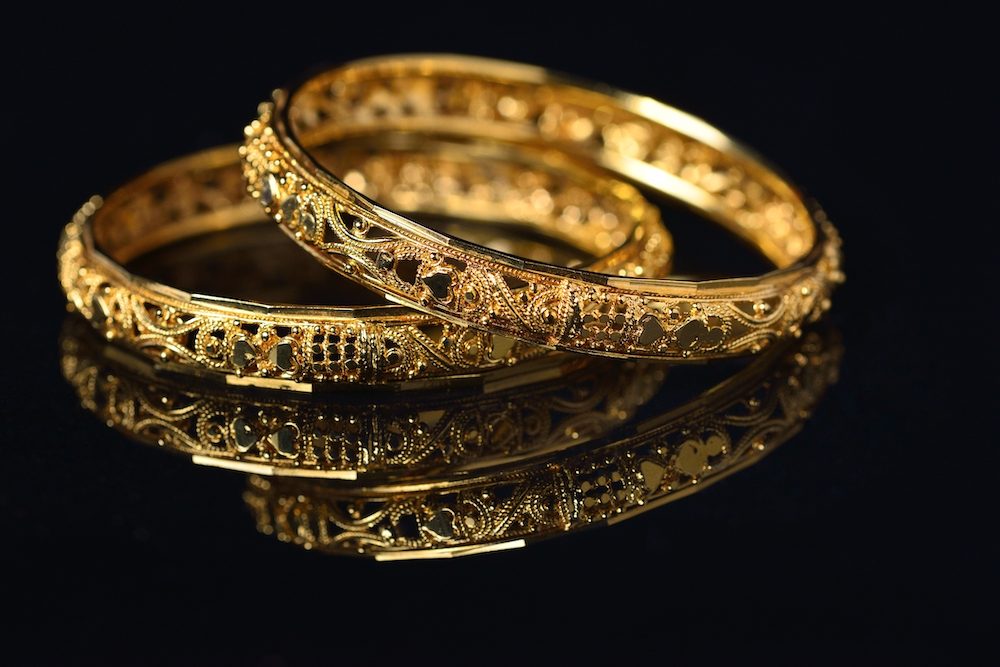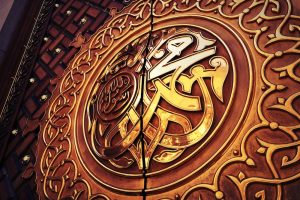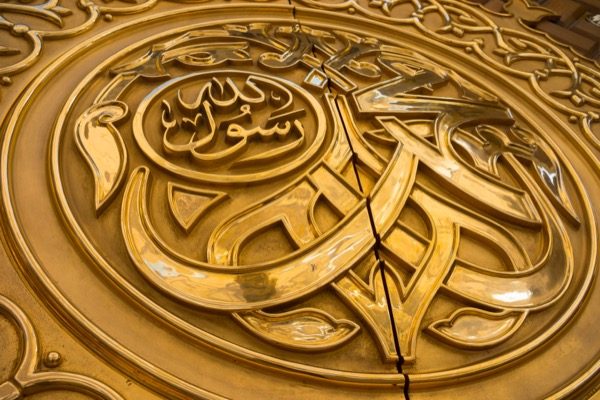How Prophet Muhammad Predicted the Downfall of one of the Most Powerful Empires of the World at His most Vulnerable Moment

Zafir Malik, UK
It’s one thing to be caught up in an attack, but its quite another if your house is surrounded by armed men, intent on killing you. So to simply walk out the front door would be akin to a death sentence. But this is the story of a man who did just this and lived to tell the tale.
On the eve Prophet Muhammad (sa) was leaving Makkah for good, he turned back to his beloved birthplace one last time and said: ‘O Makkah! By Allah, you are the best and most beloved land to Allah. Had I not been driven away from you, I would not have left you.’[1] The reason for his forced exile: his life was now in mortal danger.
Despite years of relentless persecution of the new religion, Islam, the leaders of Prophet Muhammad’s (sa) tribe – the Quraish – became frustrated with their repeated failure to stop the nascent movement from spreading. The only solution, they thought, was to kill the source of the problem – i.e. Muhammad (sa). But there was one problem; even though Muhammad’s (sa) own tribe did not follow the religion he brought, owing to Arab tribal custom, they would not allow anyone to kill him and simply get away with it. To solve this issue and to prevent Muhammad’s (sa) tribe exacting revenge on the assailant and his tribe, the leaders of the Quraish settled to share the blame and gathered strong youths from various tribes. They gave them a sword each and ordered them attack at once, so it would be impossible to tell who actually killed him. That would be the end of Muhammad (sa) and Islam…or so they thought.
But as historians describe it, he simply walked out the front door. Thinking it was too early for him to leave or that it was somebody else, the attackers all ran to hide, whilst Prophet Muhammad (sa) walked right past them.[2] But the danger was not quite over. Departing Makkah was not so straight forward as simply heading towards Madinah on the main route. This was because there was a bounty on his head: ‘100 camels to the one who brings him back, dead or alive!’[3] And so, he went in the complete opposite direction to Madinah and for three nights, took shelter in the cave, named Thaur, along with his closest companion, Abu Bakr (ra).
The Chase
After three nights had passed, on 12th September 622 C.E.,[4] Prophet Muhammad (sa) and Abu Bakr (ra) set out towards Madinah. They had arranged with a man named Abdullah bin Uraiqit to meet them at an appointed place and bring camels with him for the next leg of the journey. Although Abdullah was not a Muslim, he was a trustworthy individual and an expert guide.
What happened next is something out of this world. Whilst in the middle of an escape, being hounded down by 400 of the best trackers[5] and guides in all of Makkah, Prophet Muhammad (sa) foretold the downfall of one of the most powerful empires in the world. The wording and specifics of the prophecy are so detailed and precise that from a logical perspective, it was impossible for it to come to fruition. The prophecy was made to one of these expert trackers chasing after him – Suraqah bin Malik.
It is interesting to note that prior to this incident, in almost 13 years since the emergence of Islam, there is absolutely no mention of Suraqah. He first appears on the scene during the migration and what an entry he makes! At the time the announcement for the 100 camel bounty was made, Suraqah was sitting in a gathering of the Banu Mudlij tribe. A person came to this gathering and said: ‘I have just seen two people moving along the coast. I believe them to be Muhammad and his companion.’[6] Suraqah understood that this was indeed Muhammad (sa), but he wanted to acquire the reward for himself. So he dismissed what the person said, claiming that they were the members of a certain tribe who had just left from this very gathering. Suraqah remained seated for a short while before rushing home. He told his slave to immediately ready his horse and to take it to the rear of the house, so he could leave covertly. With bow and arrow in hand, he headed straight after them.
Prophecy Extraordinaire
Soon enough, he caught up with Prophet Muhammad (sa) and Abu Bakr (ra). As he drew close, his horse stumbled and threw Suraqah to the ground. As was customary amongst pagans, he drew lots using his arrows to seek an omen. Even though the omen was contrary to his wish, the lure of the bounty proved too much and so he got back on his horse and raced towards them again. This time, he reached so close to Prophet Muhammad (sa) that he could hear him recite verses of the Holy Qur’an. Once again his horse stumbled and according to Suraqah’s own account, the front legs of the horse became lodged into the ground so firmly that he was unable to free it from the sand.[7] Eventually with great difficulty his horse stood up. Suraqah once again drew lots with his arrows, which yielded the same result as before. This time Suraqah decided to stop his pursuit. He called out to the Holy Prophet (sa) and Abu Bakr (ra) stating that he has abandoned his idea and that he wanted to speak to them. When he caught up with them, he explained the entire incident of how the Quraish had set a bounty of 100 camels for both of them. Suraqah then asked the Holy Prophet (sa) to write him a guarantee of peace that would allow him protection, should Islam prevail over Makkah. The Holy Prophet (sa) instructed Abu Bakr to write it down on a piece of hide.[8] Suraqah offered the Holy Prophet (sa) some provisions, but he refused to take them. All he asked was for their whereabouts not to be disclosed.
As Suraqah turned to leave and the Holy Prophet (sa) started making his way in the direction of Madinah, he made the most amazing comment:
كيف بك يا سراقة إذا سورت بسواري كسرى ؟
‘How will you feel, O Suraqah, when the bangles of the Chosroes will be on your wrists?’[9]
Aside from the magnitude of these words, it is the timing which is most extraordinary. These words were said at a time when he was escaping from his own tribe. He was not physically powerful enough to battle against his own tribe and remain in Makkah, hence why he was forced to migrate to Madinah. But in the midst of his escape, he made an astounding prophecy; soon these apparently weak and feeble Muslims who could not even take on their own tribe, will crush the mighty Persian Empire. This seemed like such a far-fetched notion that even Suraqah retorted:
‘Which Chosroes? Chosroes, son of Hormizd, the Persian Emperor?’[10]
To this the Holy Prophet (sa) replied in the affirmative, and continued his onward journey to Madinah.
Breakdown of the Prophecy
There are so many layers and moving parts to this prophecy that any one of them could have nullified it, thus leaving the only conclusion that these words were Prophet Muhammad’s (sa) alone and not a glimpse of what was yet to come. There are four key elements of this prophecy:
- Muslims will conquer the Persians: They will not be defeated by any other power, because only if the Muslims defeat the Persians would they acquire the treasures of his royal court
- Suraqah will become a Muslim: The only way he would wear the bangles would be if the Muslims conquered the Persians and he accepted Islam and was thus around the Muslims or Madinah to be able to wear the bangles
- The bangles will be part of the spoils of war: They will not be taken by the fleeing Emperor or his family members
- Suraqah will live until the time this conquest takes place: Only if he remains alive will he be able to put the bangles on his wrist
Each one of these points unravels a marvel in itself and analysing it closely shows the real magnitude of this prophecy. For the Muslims to conquer the Persian empire was nothing less than a David vs Goliath match up. Albeit the Persian empire was not the beast that it once was at its peak. Towards 630 CE, the leadership changed between several monarchs in short and often bloody interval.[11] But despite all this, but they had forts, weapons and defence systems that the Muslims simply did not, nor did the Muslims have weapons or resources at their disposal to impose long sieges. To put it into perspective, the other super power at the time, the Byzantine Empire, had been at war with the Persians, on and off, for several decades. But even they could not completely defeat the Persians.
The next point to note is that up until this incident Suraqah was an idolater, but even after this extraordinary encounter he remained an idol worshiper. He accepted Islam on the occasion of the Conquest of Makkah in 8 A.H.[12] But nothing compelled him to accept Islam. He could have easily ran away and or stayed an idolater. He could have stayed in Makkah and died in any one of the battles that took place between the Makkans and the Muslims. In either case, this prophecy would never have been fulfilled. The only way this prophecy could have been fulfilled was if Suraqah accepted Islam and stayed near Madinah.
Another crucial moment in this saga came in late 635 and early 636 CE when a decisive battle took place between the Arab Muslims and the Persians known as the Battle of Qadisiyyah. When the Muslims defeated the Sassanian army, the Persian Emperor, Yazdegerd III, fled to Media in Western Iran. But crucially he took with him the royal jewels, bodyguards and some servants.[13] Interestingly enough, the bangles at the centre of this prophecy were not taken. From Media, Yazdegerd III raised another army but was crushed once again by the Muslims. Once again he was forced to flee, first to Ray, then to Isfahan. But in 651 CE he settled in a city called Merv and stayed with a miller. This miller murdered Yazdegerd III and stole the royal jewels.[14] If the bangles were with the Persian Emperor, they would not have been part of the spoils gained by the Muslims. And they would never have been captured by the Muslims after the miller ran off with the royal jewels.
The last aspect of the prophecy is the most spectacular to say the least. These majestic words were said during the middle of the migration which took place approximately 623 CE. The spoils from the war were gained after the fall of the Sassanian capital, Ctesiphon (Madain),[15] which contained the famous white palace of the Persian Emperor. This took place in approximately 637 CE. When the spoils came before the Caliph of the Muslims, Umar bin al-Khattab (ra), he called for Suraqah and told him to wear the bangles.[16] This means that in the interim 14 years from the prophecy to the conquest, Suraqah had to live throughout this time. Who can predict the weather of tomorrow, let alone say that they will live for at least 14 years? Especially given that the Muslims had constantly been at war for 14 years in which Suraqah was involved. Not to mention the countless episodes of diseases and outbreaks such as the plague. But through these words, the Prophet Muhammad (sa) effectively stated that Suraqah cannot die in the next 14 years. Had Suraqah died in this time, it would not only nullify this prophecy, but it would cast doubt over the entire claim of Prophet Muhammad (sa).
This prophecy could have been negated by any one of these steps not being fulfilled. This was not a simple prediction but had specific aspects that all needed to transpire for it to come to fruition. One or two aspects could be taken by chance, but the fact that it was intrinsically linked to global events outside the control and thought of any human adds even more brilliance to these words. It proves that Prophet Muhammad (sa) received this news from God, the knower of the future. Otherwise there is no rational explanation.
About the Author: Zafir Malik serves as the Associate Editor of The Review of Religions, having graduated from Jamia Ahmadiyya UK – Institute of Modern Languages and Theology. He is also an Imam of the Ahmadiyya Muslim Community and regularly appears as a panellist on MTA International and Voice of Islam radio station answering questions on Islam.
ENDNOTES
[1] Sunan al-Tirmidhi, Kitab al-Manaqib an Rasul Allah, Hadith no. 3925
[2] Hazrat Mirza Bashir Ahmad Sahib, The Life & Character of the Seal of the Prophet’s, Volume 1 (Tilford, UK: Islam International Publication Ltd., 2011) 319
[3] Sahih al-Bukhari, Kitab Manaqib al-Ansar, Hadith No. 3906
Ibn Hisham, Al-Sirah Al-Nabawiyyah, (Beirut, Lebanon: Al-Risalah Al-Alamiah Publishers, 2020) 95
[4] Muhammad bin Abd al-Baqi al-Zarqani, Sharh al-Mawahib al-Ladunniyyah, Volume 2, (Beirut, Lebanon: Dar al-Kutub al-Ilmiyyah, 1996), 101-102
[5] https://yaqeeninstitute.org/watch/series/suraqa-ibn-malik-ra-the-bounty-hunter-the-firsts
[6] Sahih al-Bukhari, Kitab Manaqib al-Ansar, Hadith No. 3906
[7] Sahih al-Bukhari, Kitab Manaqib al-Ansar, Hadith No. 3906
[8] Ibn Hisham, Al-Sirah Al-Nabawiyyah, (Beirut, Lebanon: Al-Risalah Al-Alamiah Publishers, 2020), 96
[9] Ali Ibn Athir, Al-Kamil fi al-Tarikh, Vol.2 (Beirut, Lebanon: Dar Sader Publishers, 2009) 53
Jalal al-Din al-Suyuti, Al-Khasais al-Kubra, Volume 2, (Beirut, Lebanon: Dar al-Kutub al-Ilmiyyah), 193
[10] Ali Ibn Athir, Al-Kamil fi al-Tarikh, Vol.2 (Beirut, Lebanon: Dar Sader Publishers, 2009), 53
[11] Mehrdad Kia, The Persian Empire: A Historical Encyclopaedia, Volume 1, (Santa Barbra, USA: 2016) 245
[12] Ibn Hisham, Al-Sirah Al-Nabawiyyah, Volume 2 (Beirut, Lebanon: Beirut, Lebanon: Dar al-Kutub al-Ilmiyyah), 132
[13] Mehrdad Kia, The Persian Empire: A Historical Encyclopaedia, Volume 1, (Santa Barbra, USA: 2016) 285
[14] Mehrdad Kia, The Persian Empire: A Historical Encyclopaedia, Volume 1, (Santa Barbra, USA: 2016) 285
[15] Nur al-Din al-Halabi, Al-Sirat Al-Halabiyyah, Volume 2 (Beirut, Lebanon: Dar al-Kutub al-Ilmiyyah, 2007), 62-63
[16] Ali ibn Athir, Usd al-Ghabah fi Ma’rifat al-Sahabah, Volume 2, Suraqah ibn al-Malik [Beirut, Lebanon: Dar al-Kutub al-Ilmiyyah] 414-415,
Jalal al-Din al-Suyuti, Manahil al-safa fi takhrij ahadith al-shufa, (Beirut, Lebanon: Muʼassasat al-Kutub al-Thaqafiyah, 1988] 161




Maa sha’Allah_ Allah has willed